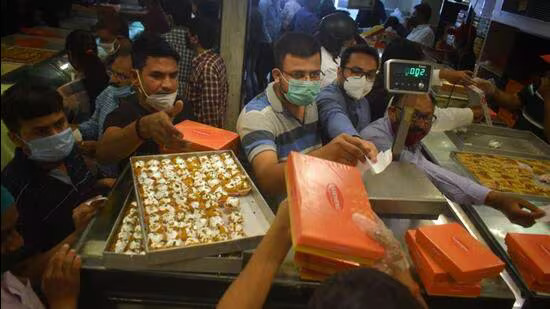With Diwali just around the corner, the festival is known for its vibrant celebrations, dazzling lights, and a wide variety of delicious sweets. However, hidden behind the tempting assortment of treats is a troubling reality that poses significant health risks to consumers: rampant food adulteration during the festive season.
The Food and Drug Administration (FDA) and other regulatory agencies ramp up their efforts during Diwali by conducting raids in Nagpur and various cities to combat this issue. However, what they discover often represents just the tip of the iceberg.
Adulterators frequently introduce harmful substances into everyday ingredients like milk, khoa (thickened milk), and ghee, which are essential for many traditional sweets. Disturbing reports have surfaced of milk being mixed with white paint, crushed toilet paper blended into khoa, and animal fat substituted for ghee. These adulterants can lead to serious health issues, transforming the festive joy into a perilous risk.
Despite the diligent efforts of authorities, many unscrupulous traders manage to evade the system and persist in their harmful practices. They cleverly disguise the adulteration, making it nearly undetectable to the naked eye. Experts caution that numerous sweets contain dangerous chemicals like starch, urea, and caustic soda (used to whiten khoa), along with synthetic dyes and other additives. These substances not only diminish quality but can also be outright toxic.
Health experts strongly urge consumers to exercise caution when buying sweets during Diwali. While the vibrant colours and attractive packaging may be enticing, it’s crucial to remember that the contents might not be pure. The chemicals used to enhance the appearance of these sweets can be more harmful than they appear.
The hygiene standards in many sweet-making establishments are alarming. Municipal Corporation and health officials often neglect the unsanitary conditions under which these sweets are prepared. If some kitchens were inspected, they would likely face immediate closure, yet enforcement remains lax. Open displays of sweets on the streets, particularly in crowded areas of Nagpur, exacerbate the risk, as flies and dust settle on uncovered items.
Nagpur’s vibrant streets are alive with festive energy, and the city’s traditional sweet shops have long been a staple of its cultural identity. However, even with the increasing popularity of gift-packed sweets, local sweet preparations still reign supreme in the market. Unfortunately, many vendors have taken to setting up makeshift kitchens, encroaching on sidewalks and intensifying hygiene concerns.
As Diwali draws near, it’s crucial for consumers to prioritize health and safety by remaining vigilant about the risks associated with adulterated sweets. Choose reputable vendors and steer clear of street-side stalls that compromise hygiene. Ultimately, celebrating Diwali should be a joyful experience, not a threat to your well-being.
👉 Click here to read the latest Gujarat news on TheLiveAhmedabad.com





